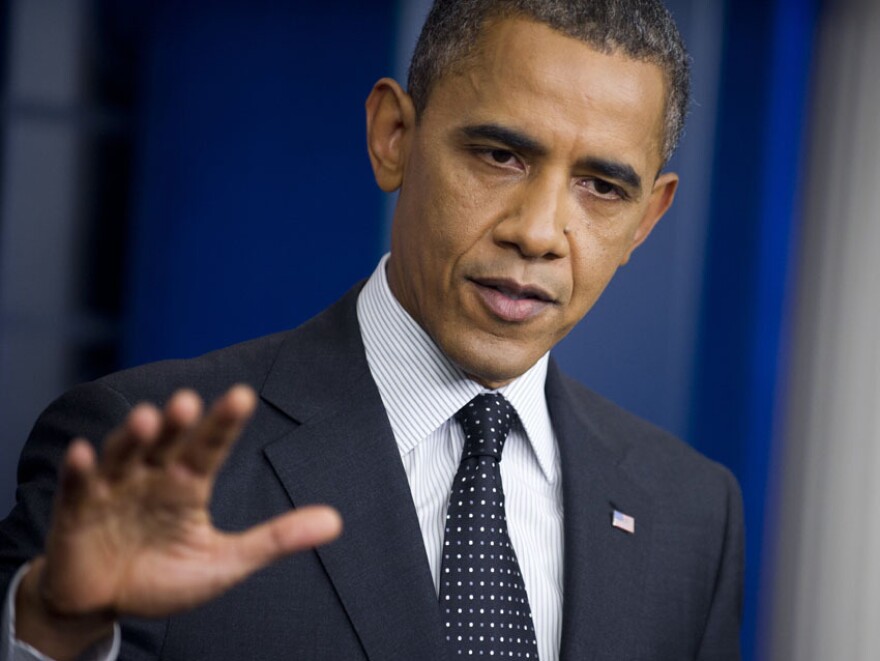To try to get a sense of what it really means to be the president of the United States, writer Michael Lewis spent six months in President Obama's shadow. Lewis hoped to find out just what it's like to be in the president's shoes — down to something as simple as how he decides what to wear every day.
"He had very self-consciously sought to eliminate all trivial decision-making from his life, such as what he wears to work," Lewis tells NPR's Renee Montagne about his interviews with the president for his piece in the October issue of Vanity Fair. "So, he says, 'I got rid of all the clothes I have except for gray suits and blue suits, so I don't even have to think about what I put on.'"
Why? The president "started talking about research that showed the mere act of making a decision, however trivial it was, degraded your ability to make a subsequent decision," Lewis says. "A lot of ... the trivial decisions in life — what he wears, what he eats — [are] essentially made for him."
Lewis has previously written about everything from the business of baseball in his book Moneyball to Wall Street in Liar's Poker. His latest book, Boomerang, was just released in paperback.
Interview Highlights

On how any decision can create a firestorm
"At some point, [Obama] decides he'd really like to have a bust of his hero, Martin Luther King, in his office. He has two of these [former British Prime Minister Winston] Churchill busts that are identical. One's up in his residence; the other one was a loaner from Tony Blair to George W. Bush. He thinks, 'I'll just move that one out.' To this day, you know, Mitt Romney is on the stump saying, among other things, when he gets the White House, he's going to restore the Churchill bust. This is ginned up into this kind of controversy."
On the president's powers
"At the center of the magazine piece is this decision whether or not to intercede in the Libyan revolution. It's a moment when [then-leader Moammar] Gadhafi and his army are marching across the desert to exterminate a city full of Libyan rebels within a few days. And the president has to decide whether he's going to do anything about it. Because if he doesn't, nobody does."
On making the decision to intervene in Libya
"He had been told that the French and the British were proposing to create a no-fly zone over Libya. His military people told Obama that a no-fly zone actually wouldn't stop Gadhafi, because Gadhafi wasn't flying. It was basically political cover — 'Look, we're doing something' kind of thing. So he goes to a meeting and he's presented with two options: One is do nothing at all, and the other is establish this no-fly zone, which he's already figured out actually doesn't do anything. So, what he does, to get an argument he's not getting from the important people in the room, is he says to the junior people in the room, 'Tell me what you think we should do.' And several of those people around the room say, 'We need to figure out a way to stop this slaughter.' ...
"And Obama turns to his generals and says, 'Go back to the Pentagon. Come back with an option that actually prevents this slaughter.' But you step back from this process and you think, here's a president basically making a decision all by himself that his top advisers would not have him make. And the consequence is, you know, a hundred-thousand people in Libya are now alive who would have been dead. To me ... it's a breathtaking power. And it's one that goes in this election season sort of hardly mentioned. Because in this case, except peripherally, it didn't seem to affect Americans very much."

On Obama's favorite place in the White House
"His favorite place turns out to be the Truman Balcony. And we go out on the Truman Balcony. He explains to me how he will just come out here at night and sit, and he likes it so much because it's the only place he gets where he feels outside the bubble. And this was one of the spine-tingling moments I had with him. Because while we're talking about how this is the normal place, how he and Michelle can come out and have a drink on the patio at midnight, and no one knows they're there kind of thing, he turns around and he points to the spot — it's right behind his head — where the bullet from the high-powered rifle hit a year ago. ...
"[A gunman] shot down from across the South Lawn, and the bullet hit the window right where Obama sits when he's having his moment of privacy and peace. And I thought, there's the presidency for you. You know, here is the place where you regard as the safe place, the place you can come and be comfortable and be normal, and people are still shooting at you."
Copyright 2021 NPR. To see more, visit https://www.npr.org.



